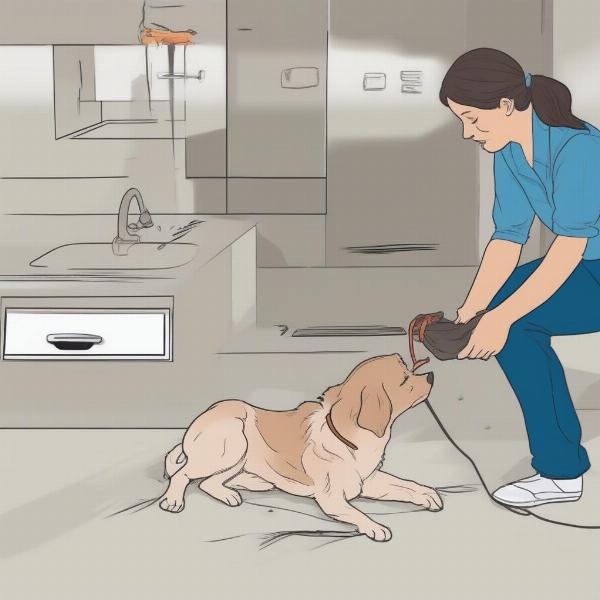Are you concerned about rodent infestations but worried about your dog’s safety? Finding rat traps dog safe is a top priority for responsible pet owners. This article will delve into safe rodent control methods, exploring various trap options and preventative measures to keep your furry friend safe while addressing pest problems. We’ll cover everything from choosing the right trap to implementing strategies that minimize risks, ensuring both a pest-free home and a happy, healthy dog.
Choosing Dog-Safe Rat Traps
When selecting rat traps, prioritize those designed with pet safety in mind. Avoid traditional snap traps placed on the floor as these pose a significant risk to curious paws. Instead, consider the following options:
- Enclosed Snap Traps: These traps house the snap mechanism within a plastic box, preventing pets from accessing the dangerous parts. Rodents can enter through small openings, triggering the trap inside.
- Electric Rat Traps: These traps deliver a high-voltage shock that quickly kills rodents. While generally safer than snap traps, ensure the trap is placed out of your dog’s reach, ideally in a secure location.
- Live Traps: If you prefer a humane approach, live traps capture rodents without harming them. These traps allow you to relocate the rodent far from your home. However, ensure the trap is checked regularly to prevent the captured rodent from suffering.
- Glue Traps: While effective, glue traps pose a significant risk to pets. If your dog steps on a glue trap, it can be a messy and distressing experience. Avoid using glue traps altogether if you have pets.
Preventative Measures for a Rodent-Free Home
Preventing rodent infestations in the first place is the best way to protect your dog. Implementing the following strategies can significantly reduce the risk of rodents entering your home:
- Seal Entry Points: Inspect your home for any cracks or gaps that rodents could use to enter. Seal these openings with caulk, steel wool, or other appropriate materials.
- Proper Food Storage: Store pet food and human food in airtight containers. Avoid leaving food out overnight, and clean up spills and crumbs promptly.
- Eliminate Clutter: Rodents thrive in cluttered environments. Keep your home tidy and organized, especially in storage areas, to reduce potential hiding places.
- Landscaping and Yard Maintenance: Trim bushes and trees near your home, and remove any debris or piles of wood that could attract rodents.
What to Do if Your Dog Encounters a Rat Trap
Even with precautions, accidents can happen. If your dog encounters a rat trap:
- Snap Trap: If your dog is caught in a snap trap, remain calm and carefully release them. Check for injuries and consult your veterinarian if necessary.
- Poison: If you suspect your dog has ingested rat poison, contact your veterinarian or a pet poison control center immediately. Rat poison can be highly toxic to dogs.
 Dog First Aid for Rat Trap Encounters
Dog First Aid for Rat Trap Encounters
Are Electronic Rat Traps Safe for Dogs?
While generally safer than traditional snap traps, electronic rat traps should still be placed out of your dog’s reach. While the shock isn’t typically fatal to a dog, it can be painful and frightening.
What are the Most Humane Rat Traps for Dogs?
Live traps are considered the most humane option for both rodents and dogs. They allow for the safe capture and relocation of rodents without causing harm.
Conclusion
Keeping your home rodent-free is essential for both your family and your furry friend. By choosing dog safe rat traps and implementing preventative measures, you can effectively control rodent populations without compromising your dog’s safety. Remember, a proactive approach is always the best defense.
FAQ
- What should I do if my dog eats a rat? Consult your veterinarian immediately. Rodents can carry diseases that can be transmitted to dogs.
- Are ultrasonic pest repellents safe for dogs? While generally considered safe, some dogs may be sensitive to the high-frequency sounds emitted by these devices.
- How often should I check rat traps? Check traps daily, especially if you suspect rodent activity.
- What is the best way to dispose of dead rodents? Wear gloves and double-bag the rodent before disposing of it in the trash.
- Can I use peppermint oil to deter rodents? While peppermint oil may deter some rodents, it’s not a foolproof solution and should be used in conjunction with other preventative measures.
- What are signs of a rodent infestation? Droppings, gnaw marks, nests, and unusual noises are all signs of a rodent infestation.
- Are there any natural rat repellents safe for dogs? Certain essential oils, like citronella and clove, can deter rodents. However, always research the safety of essential oils for dogs before using them.
ILM Dog is your dedicated resource for comprehensive dog care and wellbeing. We offer expert advice on everything from breed selection and health care to training, nutrition, and product recommendations. Our commitment is to provide dog owners worldwide with reliable, practical information to ensure their canine companions thrive. For more insights and tailored guidance, reach out to our team of experts. Contact us via email at [email protected] or call us at +44 20-3965-8624. Visit ILM Dog for a wealth of information on dog care.